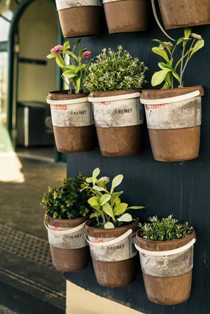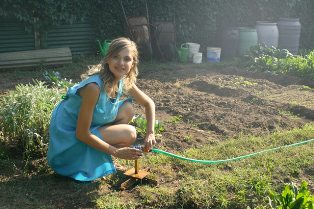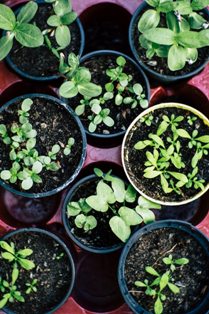Cultivating Your Child's Green Thumb During COVID-19
by Sarah Schmidt
October 13, 2020
Our children spend a lot more time at home these days. The longer the COVID-19 pandemic lasts, the harder it is to find things for them to do. Teaching your child to garden has multiple benefits that will last far beyond the coronavirus outbreak.
Why Gardening?
As Americans have spent more time at home and faced economic uncertainty in the wake of the coronavirus pandemic and recession, more have reported undertaking new projects. In the report Home Gardening Consumer Insights, market research firm Packaged Facts reveals that 38% of consumers agree they are spending more time on outdoor projects due to the coronavirus, while 31% are undertaking home improvement projects and 22% are planting a food garden in response.
Packaged Facts also found that since the pandemic, gardening has been used by more Americans as a stress relief activity, especially because more people have been staying at home more and thus have more time or desire to dedicate to gardening. Additionally, during times of economic uncertainty, some consumers turn to gardening for food since growing fruits and vegetables is a low-cost activity.
For parents specifically, gardening gets your children off the sofa, away from the computer, and out in the fresh air. It’s a positive, relaxing activity in which the entire family can take part.
Gardening improves balance, strengthens muscles, joints, and bones, and sharpens hand-eye coordination. Children learn about and see the growing cycle of plants, and even the water cycle, so gardening acts as a science lesson as well.
It’s also a good opportunity for kids to learn where some herbs and vegetables come from and how a family can take food security into their own hands. Gardening can be especially important for city children who may not otherwise have a chance to get their hands in the dirt.
During a pandemic, kids have little control over many aspects of their lives. Gardening is something they CAN control. There’s consistency in the daily watering, adding nutrients to the soil, and making sure the plants are getting sun. And the outcome is expected and something to look forward to.
Best Gardens For Kids
Container Garden

When you don’t have a yard or any outdoor space, container gardens are a perfect choice. You can buy cardboard containers, clay pots, or even cut the tops off of plastic milk jugs to use as planters.
Children can make their own decisions about what to plant. Container plants are less susceptible to insects and disease. As long as you have potting soil, seeds, and a sunny windowsill your kids are ready to garden!
Backyard Garden

If you’ve got the space, a backyard garden is great for kids. They’ll have room to roam and really dig around in the dirt.
Give your children a voice in what’s planted. Do they love cherry tomatoes? Plant them and let the kids pick them when ripe and eat them off the vine. Create garden markers as an art activity. Give them some physical activity with weeding, planting, watering, and picking.
Having a backyard garden is a source of pride for your kids and they’ll be anxious to share with their teacher and classmates during virtual lessons if their school is online only these days.
Herb Garden

It’s hard to mess up an herb garden, making it a great choice for a family project. All you need are some small containers, a bit of soil, water, and sunshine. Or you can use starters from your local nursery.
Children may not know the names of many herbs or even that they are used in cooking. This is a great way to broaden their knowledge of this type of plant and how their flavor enhances what we eat.
Keep the herb garden small to keep it fun. If a kid is overwhelmed by the work that goes with a huge plot or too many containers, it becomes a job and not a hobby.
Rain Garden

For something altogether different, a rain garden may be just what you need to keep your children occupied during the pandemic. The name is a bit misleading because this garden is only wet for about two days after significant rainfall and is dry the rest of the time.
A rain garden is a collection of shrubs, grasses, and perennials planted in a low area of ground. These plants collect water that runs off roofs, downspouts, and lawns after a heavy rain. The benefit? That runoff (often full of chemicals and sediments) is stopped before it enters our storm drains and waterways.
Let your kids choose the greenery for your rain garden and help in its maintenance. This is a great way to teach about our environment, pollution, and how to keep our water supply safe.
Real-World Lessons from Gardening
Linking gardening to science and other subjects your children are studying, whether in person or remotely, helps them make real-world connections. It’s also a great lesson in economics, since having fresh produce saves a trip to the grocer and they’ll have something to look forward to each day, even when social distancing and COVID-19 is keeping them at home.
This blog was written by guest contributor Miranda Culvert. Miranda has been gardening since she was three years old, thanks to her parents who owned a produce stand. She has passed her love of gardening onto her three children, one of whom has a booth at the local farmers market.
Have unique research needs?
Freedonia Custom Research listens intently to your needs and objectives. Then we work diligently to define and deliver a service to meet them.Subscribe to Our Blog
Stay up to date with the latest information about new market research and news in areas relevant to your business from our analysts and team members.Packaged Facts Blog Subscription
Provide the following details to subscribe.